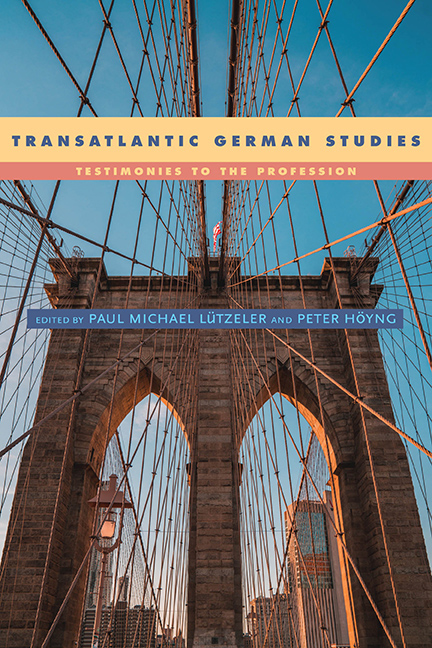Book contents
- Frontmatter
- Dedication
- Contents
- Acknowledgments
- Introduction
- From Erfahrungshunger to Realitätshunger: Futurity, Migration, and Difference
- In-between: The Participant as Observer—The Observer as Participant
- Transatlantic Space and My Own History of Globalization
- Deplazierte Personen: Why Would an American Become a Germanist?
- Metamorphoses and Meanderings of a Wanderer between Worlds
- German Studies as Vocation: My Path into It, Out of It, and Back into It
- My Long Way from Germanistik to Afro German Studies
- Mustang Red: My American Road to Critical Theory
- Third Place: How a French Germanist Became an Applied Linguist in America
- Transatlantic Exchanges: German Studies—European and American Style
- Being at Home in the Other: Thoughts and Tales from a Typically Atypical Germanist
- After Australia: Triangulating an Intellectual Journey
- A Tale in Translation: An Academic Itinerary from Istanbul to Bryn Mawr
- Beyond Passing: Transculturation in “Contact Zones”
- Far from Where? Germanistik between the Continents
- Epilogue: The Usefulness of Useless Studies
- Index
Beyond Passing: Transculturation in “Contact Zones”
Published online by Cambridge University Press: 14 February 2019
- Frontmatter
- Dedication
- Contents
- Acknowledgments
- Introduction
- From Erfahrungshunger to Realitätshunger: Futurity, Migration, and Difference
- In-between: The Participant as Observer—The Observer as Participant
- Transatlantic Space and My Own History of Globalization
- Deplazierte Personen: Why Would an American Become a Germanist?
- Metamorphoses and Meanderings of a Wanderer between Worlds
- German Studies as Vocation: My Path into It, Out of It, and Back into It
- My Long Way from Germanistik to Afro German Studies
- Mustang Red: My American Road to Critical Theory
- Third Place: How a French Germanist Became an Applied Linguist in America
- Transatlantic Exchanges: German Studies—European and American Style
- Being at Home in the Other: Thoughts and Tales from a Typically Atypical Germanist
- After Australia: Triangulating an Intellectual Journey
- A Tale in Translation: An Academic Itinerary from Istanbul to Bryn Mawr
- Beyond Passing: Transculturation in “Contact Zones”
- Far from Where? Germanistik between the Continents
- Epilogue: The Usefulness of Useless Studies
- Index
Summary
IT BEGAN WITH HUNGER for what I was not, hunger stoked by such mundane things as European peasant paper dolls, by whispered mentions of war brides, by appetites whetted by Midwestern 1950s educational practices in a time and place where international connections remained few and difficult for ordinary people to make. Less than two decades after the end of the Second World War, well-intentioned grade school teachers in Terre Haute, Indiana, made clumsy attempts to recognize and celebrate alien cultures—mainly European ones, that is, until Hawaii became a state and we grade-schoolers were taught to dance the hula. In third grade at the Laboratory School of Indiana State Teachers College, I was assigned to Denmark for a school pageant. My mother fashioned a costume from one of her old skirts. We danced and sang in Danish—unbeknownst to me at the time, it was a little love poem by Hans Christian Andersen. Much later on—I couldn't help myself—I learned Danish. Two years later, in another Indiana town, in the shadow of another university but not as part of it, we celebrated European cultures yet again. This time, my fifth-grade class was assigned Germany. Mother hauled out the Danish costume.
I have no idea what we sang in German, but I do remember my dance partner. He was tall and teased me as we rehearsed by stretching his right hand up as high as he could so I couldn't reach it for our dance, a folkdance, which, as I recall, required arm pumping. As soon as he would relent and lower his hand, I seized it and off we went. Later—I couldn't help myself—I learned German. This tussle with my flirtatious and slightly mean dance partner presaged things to come in my professional life. Fortunately, I learned strategies of stretching, and either the profession, on both sides of the Atlantic, became more welcoming to intruders or I became less intrusive.
The Public University as a Foreign Outpost
In my freshman year at Indiana University, I lived through a panty raid and a student strike as one era smashed against another.
- Type
- Chapter
- Information
- Transatlantic German StudiesTestimonies to the Profession, pp. 231 - 248Publisher: Boydell & BrewerPrint publication year: 2018

